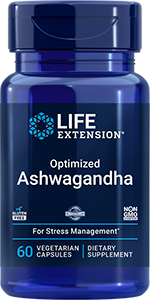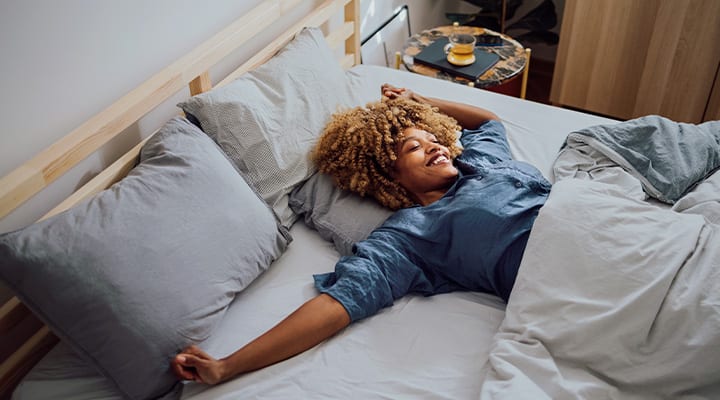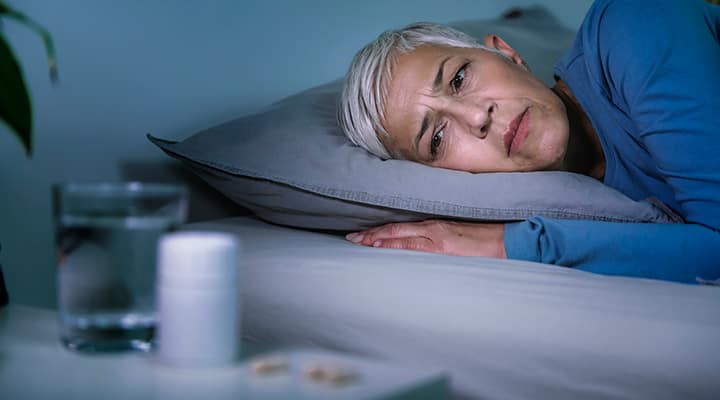
Ashwagandha and Melatonin: Do They Work Together?
Published: January 2022 | Updated: May 2024
If you've found yourself in a pre-dawn staring match with the clock on your bedside table more nights than you'd care to admit, you're not alone. In the U.S., somewhere between 50 and 70 million people aren't getting optimal sleep, with 11% reporting that they don't sleep enough.
Fortunately, there are nutrients to help you get the ZZZs you need–which is key, since getting better sleep is crucial to your overall health. Two sleep supplements that people commonly take to get better rest are ashwagandha and melatonin. Let's talk about each one individually, how they work together, plus other ways you can get better sleep…starting tonight!
What is ashwagandha?

Ashwagandha, also known as Withania somnifera, is an ancient herb traditionally used in Ayurvedic practices that grows throughout Asia (specifically, India and Sri Lanka) and Africa. Many wellness professionals categorize it as an adaptogen. This means that it's a substance that can help your body adapt to both physical and mental stress. It has a long history of use and has been used to promote physical and mental energy as well as mental health.
Sure enough, studies have suggested that ashwagandha can support how your body responds to stress. And if you struggle with sleep because worries are keeping you up at night, this ancient herb might help you finally calm your mind and drift off to sleep, another study found.
Added bonus: an ashwagandha supplement may provide a number of other benefits, including supporting already-healthy cholesterol levels, a healthy inflammatory response, healthy nervous system and hormone function, and weight management and body composition. Ashwagandha also supports memory and focus–key for anyone who's been groggy after a rough night of tossing and turning!
What is melatonin?
Melatonin is a hormone that is primarily produced by your brain's pineal gland. Its job is to signal to your body that it's time to sleep. For this reason, your body produces more melatonin at night, and then levels drop in the morning, letting your body know that it's time to wake up and get to work. This sleep cycle is what we call the circadian rhythm. Supplementing with melatonin helps people who are struggling to sleep finally "shut down"—and get some rest.
Similar to ashwagandha, melatonin can also help maintain already-healthy cortisol levels (cortisol is a stress hormone), therefore possibly supporting your mood and ability to manage stress.
Ashwagandha vs. melatonin
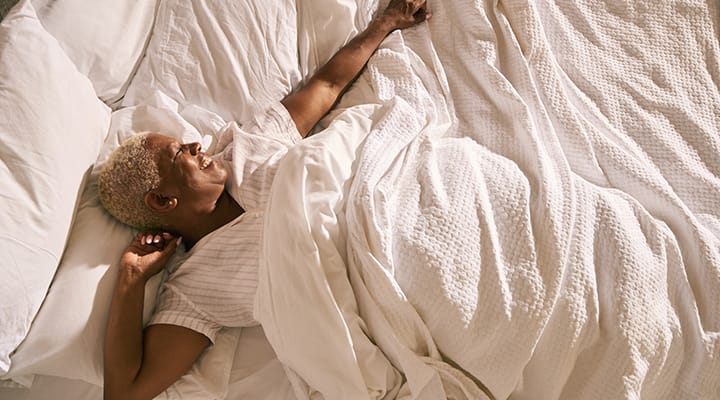
Both ashwagandha and melatonin have the potential to make you feel sleepy and relaxed. While melatonin can be made in the body naturally, levels can decline over time; melatonin supplements are a good option when your natural levels of this hormone have declined, which happens often as we age. Ashwagandha is a plant with a long history of use to promote feelings of relaxation.
Importantly, taking melatonin outside of the nighttime could potentially throw your body off its natural sleep/wake cycle. You can take an ashwagandha supplement, on the other hand, at any time during the day. It may help you feel more at peace, but unlike melatonin, it doesn't directly promote sleep. Rather, it helps you return to a state of calm. So, you could take it day or night.
Can you take ashwagandha and melatonin together?
If sleep sometimes eludes you because you've got a lot on your mind, taking ashwagandha and melatonin together is a good idea. The ashwagandha supports a calmer mental state, so your last thoughts of the day won't be about whether you forgot your sister-in-law's birthday or what your coworker really meant with that remark. Then melatonin will kick in to do its work of supporting a healthy night's sleep.
The key, though, is to make sure you're getting the right amount of each of these nutrients–you don't want to take too much. Your best bet is a supplement that combines both in one formula. Life Extension's Rest & Renew offers 120 mg of a proprietary ashwagandha extract and 1.5 mg of melatonin, offering an optimal balance of both ingredients. The specific type of ashwagandha used, Shoden®, was found to help improve sleep quality after six weeks of use.
Shoden® is a registered trademark of Arjuna Natural Pvt. Ltd.
When is the best time to take melatonin with ashwagandha?
Because this supplement is formulated to help you sleep better, you should take it 30 to 60 minutes before you go to sleep, unless otherwise advised by your medical professional.
What kind of supplement is ashwagandha with melatonin? Does it work?
Some supplements give you the best of both worlds and include ashwagandha with a little bit of melatonin. With the two combined, you position yourself to get more sleep and a higher quality of sleep, both of which are necessary for recharging your body.
How much melatonin with ashwagandha should I take?
This will depend on the specific supplement you're taking. Melatonin products vary, but a typical dose is 1 mg to 10 mg. Consult your doctor first, or to be safe, always start on the lower end. Ashwagandha supplements are usually around 120-125 mg.
Are there any side effects?
Both melatonin and ashwagandha are safe to take. The key is to follow the instructions and dosage on the bottle. You shouldn't drink alcohol, drive, or operate heavy machinery after taking melatonin.
Generally, ashwagandha is safe to use, with a centuries-long track record. That being said, stop taking any supplement immediately if you notice any side effects.
6 other sleep supplements for a restful night
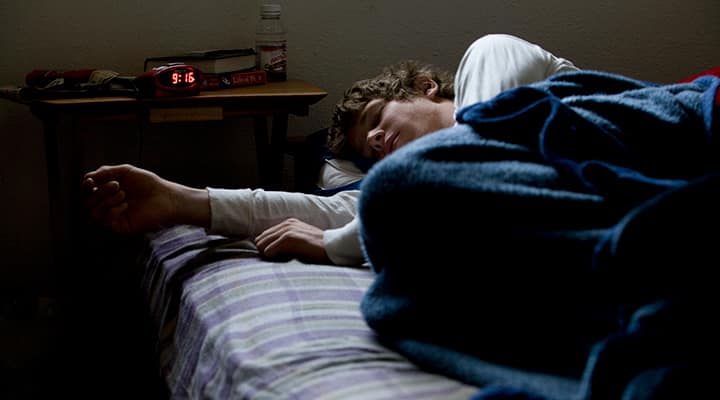
Ashwagandha and melatonin aren't the only supplements for sleep. If you're having trouble sleeping, you might also consider trying:
L-theanine
: This can support a healthy stress response and promote a calm, relaxed state of mind.Glycine
: This essential amino acid has a calming effect on the brain and promotes relaxation without causing drowsiness.Valerian root
: A meta-analysis of 60 studies including 6,894 participants demonstrated that valerian could be a safe and useful herb in promoting sleep.Herbal Sleep PM
: Life Extension makes this formula out of lemon balm, honokiol, and chamomile extracts. It's melatonin-free.Tryptophan
: This supplement helps you both manage stress and achieve more restful sleep.Ginkgo biloba:
Older studies from 2001 suggest that consuming ginkgo biloba before bed may help promote a healthy stress response, enhance relaxation and promote sleep.
Explore Our Best Sleep Supplements
8 other ways to fall asleep
Supplements can be an excellent part of a more holistic approach to getting better sleep. But they are only a piece of the puzzle. "As with other health goals, I always recommend finding out the root cause. Sleep supplements can be part of a healthy sleep routine, as long as underlying issues are addressed," said Life Extension registered dietitian Holli Ryan.
Ryan offered these tips to try the next time you're having a hard time falling asleep.
1. Move your body during the day
We know that it's hard to stay active, especially if your job has you sitting at a desk all day. However, research says that physically active people tend to sleep better. We're not telling you to run a marathon every day. Even just a walk around the neighborhood or 15 minutes of yoga can make a big difference.
2. Establish a sleep schedule
Sticking to a consistent sleep schedule helps your body better understand when it's time to calm down and sleep and when it's time to wake up and be active. Even on the weekends, try to go to bed and wake up at roughly the same time.
3. Limit your caffeine and alcohol intake
Caffeine can delay the timing of your body clock, inhibiting how much time you spend sleeping, especially in deep sleep. While you might be drinking alcohol to relax, it's been linked to poor sleep quality and length. Drinking in excess can keep you up all night, and it can even cause your breathing to repeatedly stop and start while you sleep.
4. Put your phone away at least an hour before you go to sleep
It's tempting to scroll through social media or check email right before bed. However, you might want to sign off and put your gadgets away in advance. "Blue light from phones and other devices interrupts melatonin production," explained Ryan.
This is why playing on your phone or watching TV late at night can disrupt your sleep. Commit to going technology-free at least 30 minutes before bed. Or, you could switch your gadgets to nighttime mode or use a blue light filter.
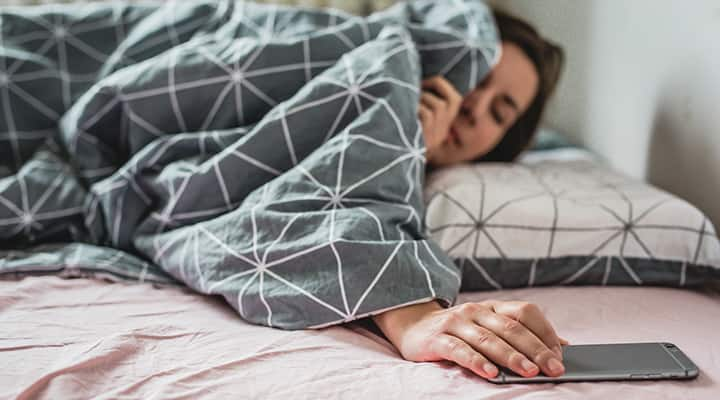
5. Adjust the thermostat
If your room is too hot or too cold, you might not sleep as well. Try setting your thermostat to approximately 65 degrees Fahrenheit (18.3 degrees Celsius). Science says that this is the optimal temperature for quality sleep.
6. Keep napping to a minimum
Do you regularly nap throughout the week? If so, research says that this could be the cause of your lack of good sleep. Even if it means powering through a few tiring days, aim to get enough sleep at night, so that you don't feel the need to nap throughout the day.
7. Get your daily dose of sunlight
Getting sunlight in the morning can help you fall asleep faster and get a higher quality of sleep. This is because it helps to reset, maintain and reinforce your circadian rhythm. Even if it's a quick walk around the neighborhood, a little outdoor time does the body good.
8. Try meditation
Research tells us that mindfulness–specifically, meditation–can help promote sleep and mood. Set a timer for even five minutes, or try an app like Headspace (which you can use for free!).
High-quality sleep supplements formulated with scientifically studied ingredients can be a helpful part of a healthy lifestyle. Combine these with a consistent sleep schedule, physical activity, and a healthy diet, and you're on your way to better rest!
References
- Andallu B et al. "Hypoglycemic, diuretic and hypocholesterolemic effect of winter cherry (Withania somnifera, Dunal) root." Indian J Exp Biol. June 2000. https://pubmed.ncbi.nlm.nih.gov/11116534/
- Black, David S., PhD, MPH et al. "Mindfulness Meditation and Improvement in Sleep Quality and Daytime Impairment Among Older Adults With Sleep Disturbances: A Randomized Clinical Trial." Jama Intern Med. April 2015. https://jamanetwork.com/journals/jamainternalmedicine/fullarticle/2110998
- Burke, Tina M. et al. "Effects of caffeine on the human circadian clock in vivo and in vitro." Science Translational Medicine. September 2015. http://stm.sciencemag.org/content/7/305/305ra146
- Chandrasekhar, K et al. "A prospective, randomized double-blind, placebo-controlled study of safety and efficacy of a high-concentration full-spectrum extract of ashwagandha root in reducing stress and anxiety in adults." Indian J Psychol Med. July 2012. https://pubmed.ncbi.nlm.nih.gov/23439798/
- Claustrat, B et al. "Melatonin: Physiological effects in humans." Neurochirurgie. April 2015. https://pubmed.ncbi.nlm.nih.gov/25908646/
- Deshpande, Abhijit et al. "A randomized, double blind, placebo controlled study to evaluate the effects of ashwagandha (Withania somnifera) extract on sleep quality in healthy adults." Sleep Med. August 2020. https://pubmed.ncbi.nlm.nih.gov/32540634/
- Langade, Deepak et al. "Efficacy and Safety of Ashwagandha (Withania somnifera) Root Extract in Insomnia and Anxiety: A Double-blind, Randomized, Placebo-controlled Study." Cureus. September 2019. https://www.ncbi.nlm.nih.gov/labs/pmc/articles/PMC6827862/
- Murray, B J et al. "The effect of Li 1370, extract of Ginkgo biloba, on REM sleep in humans." Pharmacopsychiatry. July 2001. https://pubmed.ncbi.nlm.nih.gov/11518478/
- Pacheco, Danielle. "Alcohol and Sleep." Sleep Foundation. November 2019. https://www.sleepfoundation.org/nutrition/alcohol-and-sleep
- Pacheco, Danielle. "How Electronics Affect Sleep." Sleep Foundation. November 2020. https://www.sleepfoundation.org/how-sleep-works/how-electronics-affect-sleep
- Pacheco, Danielle. "The Best Temperature for Sleep." Sleep Foundation. June 2024. https://www.sleepfoundation.org/bedroom-environment/best-temperature-for-sleep
- Samadi Noshahr, Zahra et al. "Protective effects of Withania somnifera root on inflammatory markers and insulin resistance in fructose-fed rats." Rep Biochem Mol Biol. April 2015. https://pubmed.ncbi.nlm.nih.gov/26989739/
- Savage, Rosemary A. et al. "Melatonin." StatsPearl. August 2021. https://www.ncbi.nlm.nih.gov/books/NBK534823/
- Shinjyo, Noriko et al. "Valerian Root in Treating Sleep Problems and Associated Disorders—A Systematic Review and Meta-Analysis." J Evid Based Integr Med. 2020. https://www.ncbi.nlm.nih.gov/labs/pmc/articles/PMC7585905/
- Tähkämö, Leen et al. "Systematic review of light exposure impact on human circadian rhythm." Chronobio Int. February 2019. https://pubmed.ncbi.nlm.nih.gov/30311830/
- Wankhede, Sachin et al. "Examining the effect of Withania somnifera supplementation on muscle strength and recovery: a randomized controlled trial." J Int Soc Sports Nutr. November 2015. https://pubmed.ncbi.nlm.nih.gov/26609282/
- Yang, Pei-Yu et al. "Exercise training improves sleep quality in middle-aged and older adults with sleep problems: a systematic review." Journal of Physiotherapy. September 2012. https://www.sciencedirect.com/science/article/pii/S1836955312701066
- Ye, Lichuan et al. "Napping in college students and its relationship with nighttime sleep." J Am Coll Health. 2015. https://pubmed.ncbi.nlm.nih.gov/25397662/
- "The state of sleep health in America." American Sleep Apnea Association. https://www.sleephealth.org/sleep-health/the-state-of-sleephealth-in-america/

